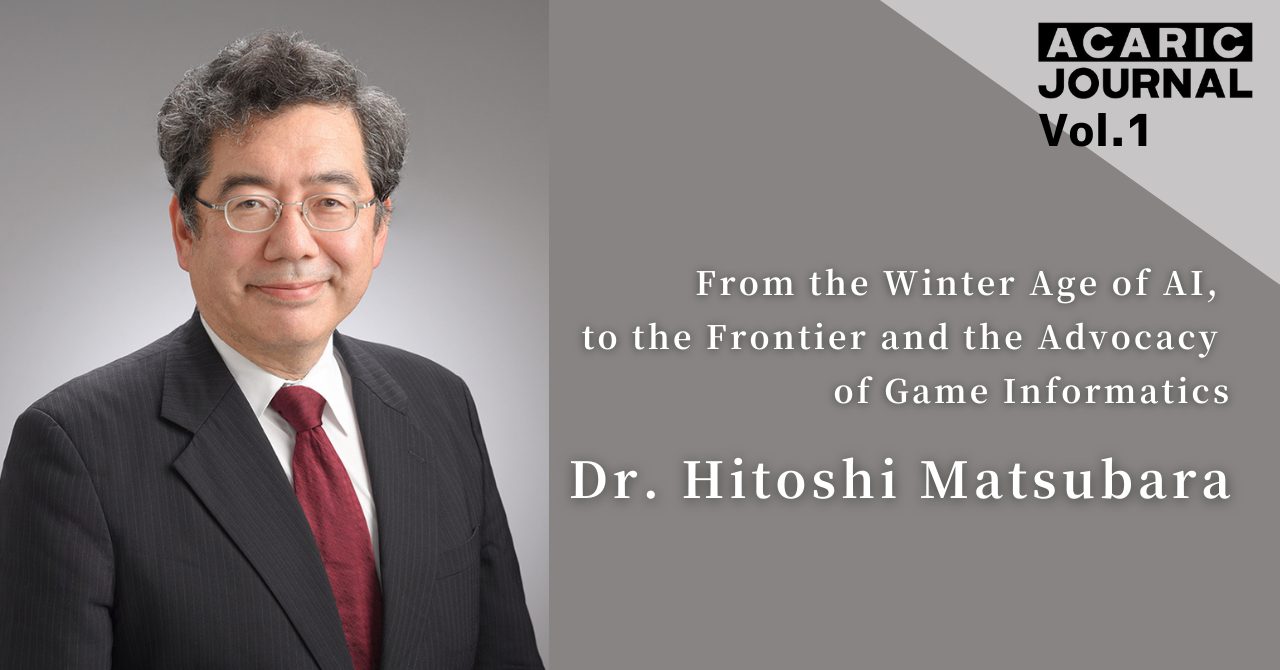It may be hard to believe today, with the unprecedented AI boom and artificial intelligence beating humans in quiz shows and Go games, but there was a time when it was taboo to aspire to artificial intelligence research. At that time, there was a researcher who dared to combine artificial intelligence and games. What does Dr. Matsubara expect from these young researchers? We asked him about it.
– What kind of AI research were you involved in at first?
The first program I wrote was a Shogi (Japanese chess) program. When AI was still cold, my professor told me that he could not support my research on Shogi programs, because it was too difficult. So, ostensibly, I was working on image recognition research for robots and I didn’t show my work on shogi at all, but worked on Shogi programs secretly at home.
About three or four years after I joined Dentsu, I published a paper on computer Shogi. I asked the people around me how they felt about it, and when I thought it would be acceptable to research Shogi program, I published it. The researchers responded that it was okay, but the office staff said, “Shogi is just a hobby” (laugh). Even so, I worked very hard to write a reason and was accepted little by little, and they said something like, “It is weird to do research of AI originally, Shogi program research is quite abnormal.” In other countries, people think it is normal to choose games as a research theme.
– So you’ve been on the foremost line too long.
To put it stylishly, yes. There were many people who wanted to do research in AI or games, but they were persuaded and switched the research themes. Others told that I was insensitive and didn’t care about the cold-heartedness of the people around me.
– What kind of research and activities have you been involved in after your time at Electrotechnical Laboratory?
I was interested in a lot of things, so I have been involved in everything from organizing the RoboCup to AI analysis of Hakodate tourism, etc. For the development of AI, I would like to see more research on Shogi and Go, so I founded Game Informatics for younger students.
– Please tell us how you started your research on tourism at Future University Hakodate.
One of the missions of a public university is to contribute to the local community. In rural areas, there are AI fields such as fishery and agriculture, but in Hakodate, the main industry is tourism. It would be interesting to analyze this with AI, and AI can also be useful in terms of foreign language use with foreigners. The reason why I came to Hokkaido is because I like Hokkaido and have traveled there often since I was a student. As the environment became newer, my research themes increased, and due to the inconvenience of transportation in Hokkaido, I am also researching transportation. I started my research because I was interested in many things, but there are many researches that I spent a lot of time on but did not become a outcome.
– Now that we are in the third AI boom, there is a tendency to accumulate results that can be achieved in a short period of time. What do you think about it?
Nowadays, research tends to be conducted on the level of infield hits, aiming for a steady stream of hits. In my days, even if I struck out for a home run, no one would look back. I was doing research in a discipline that had been like abandoned, so it didn’t matter even if I didn’t succeed. Today, we are blessed to be in the spotlight, but it is getting harder to hit a home run.
When AI is booming, people say that with the latest technology such as deep learning, there is nothing left to do. But this is not the case at all. If you compare human intelligence to the top of a mountain, people optimistically say that we will reach the top soon, but we never did. In an interview I gave during the second boom, I remember saying, “We’re just at 10% of the mountain.” Since then, AI research has advanced a lot, but I still think it is only at the 30%. It’s up to younger people to solve the other 70%. So please do your best, even though you have a long way to go.
– Could we have a message for students?
I want you to follow the path that interests you. Dare I say it, always question the research and technology that is being done now. AI can do amazing things in its own way, but it also has its drawbacks. Study it carefully, find its limitations, and figure out how to overcome them. Once you are able to successfully mimic your supervisor, be aware of how to go beyond them. It is good to listen to others carefully, but do not swallow all in them. Believe in yourself and have the spirit to overcome even your seniors.
Translated with www.DeepL.com/Translator (free version) and Acaric Journal Editorial Board
Profile
Dr. Hitoshi Matsubara
Born in 1959 in Tokyo, Japan. Dr. Matsubara received his doctorate in Information Technology from the University of Tokyo in 1986. He joined the National Institute of Electronics and Information Technology (now the National Institute of Advanced Industrial Science and Technology (AIST)) in 1986, became a professor at the School of Systems and Information Science, Future University Hakodate in 2000, and has been a professor at the University of Tokyo’s Research Center for Next-Generation Intelligence since 2020. His research interests include artificial intelligence and game informatics.



